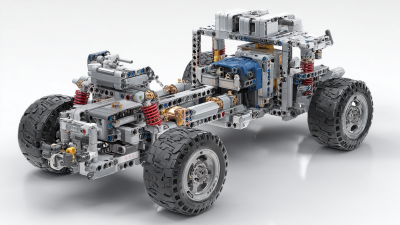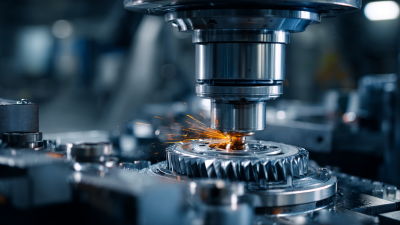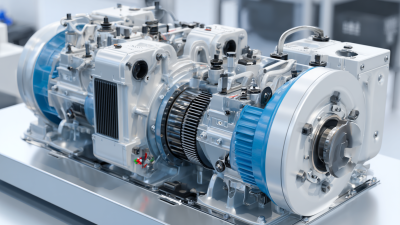Exploring Innovations in Mechanical Engineering Tech for Sustainable Solutions
The field of mechanical engineering tech is at the forefront of innovations that are paving the way toward sustainable solutions across various industries. According to the Global Mechanical Engineering Market Report 2021 by Research and Markets, the global mechanical engineering market is projected to grow at a compound annual growth rate (CAGR) of 6.5% from 2021 to 2028, driven by advancements in technology and increasing demand for energy-efficient designs. The integration of digital technologies, such as IoT and AI, is revolutionizing the design and manufacturing processes, enabling engineers to create more sustainable products. Furthermore, a report by the International Energy Agency reveals that embracing these innovations could lead to a significant reduction in greenhouse gas emissions, underscoring the vital role of mechanical engineering tech in achieving sustainability goals. As we explore the latest developments, it becomes evident that the future of mechanical engineering is not only about enhancing performance but also about ensuring a sustainable environment.

Innovative Design Techniques for Sustainable Mechanical Engineering Solutions
Innovative design techniques play a crucial role in advancing sustainable mechanical engineering solutions. By integrating principles of sustainability at the design stage, engineers can create systems and products that minimize environmental impact while maximizing efficiency and functionality. One such technique is the use of computer-aided design (CAD) combined with simulation tools, which allows for detailed analysis of material properties and energy flows early in the design process. This enables engineers to optimize designs for durability and resource efficiency, reducing waste and energy consumption throughout the product lifecycle.

Another promising approach is the adoption of biomimicry, where engineers draw inspiration from nature to solve complex design challenges. By studying the efficient systems found in biological organisms, engineers can develop innovative solutions that are not only effective but also environmentally friendly. For example, implementing designs that mimic the structural efficiency of bird bones can lead to lighter and stronger materials while requiring less energy for production. These innovative design techniques underscore the potential of mechanical engineering to contribute to sustainable development, paving the way for a greener future while meeting the demands of modern society.
Integration of Smart Materials in Eco-Friendly Engineering Applications
The integration of smart materials in eco-friendly engineering applications represents a pivotal shift in the mechanical engineering landscape, promoting sustainability without sacrificing functionality. Smart materials, which respond dynamically to external stimuli such as temperature, stress, or electric fields, are revolutionizing approaches in industries ranging from aerospace to construction. According to a report by Market Research Future, the global smart materials market is projected to reach USD 103 billion by 2025, showcasing a compound annual growth rate (CAGR) of 15.5% from 2019 to 2025. This surge reflects the increasing demand for innovative solutions that enhance efficiency while aligning with environmental goals.
Eco-friendly engineering, enhanced by the unique properties of smart materials, allows for the development of structures that can adapt to their environments. For instance, shape memory alloys (SMAs) can alter their form in response to temperature shifts, optimizing energy efficiency in applications such as seismic-resistant buildings. Additionally, piezoelectric materials are being utilized to capture waste energy in transportation systems, further reducing the carbon footprint of engineering projects. The National Renewable Energy Laboratory indicates that the integration of such materials could lead to a 30% reduction in energy consumption in various sectors by 2030, a testament to the potential of smart materials to drive sustainable innovation within mechanical engineering.
Advanced Manufacturing Processes for Reduced Environmental Impact
Advanced manufacturing processes play a pivotal role in reducing environmental impact and promoting sustainability within mechanical engineering. Techniques such as additive manufacturing, often known as 3D printing, allow for the creation of complex components with minimal material waste. Traditional subtractive methods typically remove excess material, leading to higher waste levels. In contrast, additive processes build items layer by layer, which not only enhances material efficiency but also enables the production of lightweight structures that can improve energy efficiency in applications ranging from automotive to aerospace.
Furthermore, the integration of digital technologies, such as the Internet of Things (IoT) and artificial intelligence (AI), optimizes manufacturing operations to minimize resource consumption. Smart manufacturing systems monitor energy usage in real-time, allowing for adjustments that cut down on waste. By utilizing machine learning algorithms, manufacturers can predict maintenance needs, thereby preventing downtimes and further reducing emissions associated with inefficient operations. This convergence of innovation and sustainability in mechanical engineering signifies a transformative approach towards an environmentally conscious industrial landscape.
Impact of Advanced Manufacturing Processes on Environmental Sustainability
Role of Automation and AI in Promoting Sustainability in Mechanical Systems
The integration of automation and artificial intelligence (AI) in mechanical engineering has become a significant driver for sustainability, especially in the context of gear and gear motor markets. Recent industry reports indicate that industrial automation now represents approximately 70% of gearbox applications, underscoring its crucial role in optimizing efficiency across various sectors, including robotics and conveyor systems. This dramatic shift not only enhances productivity but also reduces energy consumption and waste, aligning with global sustainability goals.
In addition, the advancements in AI are revolutionizing predictive maintenance and resource management within mechanical systems. For instance, studies highlight that AI-driven systems can predict equipment failures up to 70% more accurately than traditional methods, enabling businesses to minimize downtime and extend the lifespan of their machinery. The ongoing development of smart technologies further supports the transition towards greener manufacturing processes, making it essential for companies to embrace these innovations to remain competitive and environmentally responsible.
Exploring Innovations in Mechanical Engineering Tech for Sustainable Solutions
| Innovation | Description | Impact on Sustainability | Automation/AI Role |
|---|---|---|---|
| Smart Manufacturing | Integration of IoT devices for real-time monitoring of production. | Reduces waste and improves energy efficiency. | AI optimizes production schedules based on data insights. |
| Additive Manufacturing | 3D printing technologies for lightweight components. | Minimizes material waste and allows for recycling of materials. | Automated design and printing processes enhance precision. |
| Energy Harvesting | Technologies to capture energy from the environment. | Provides sustainable energy solutions for remote devices. | Automation for efficient energy conversion and management. |
| Robotic Process Automation | Robots handle repetitive tasks in manufacturing. | Enhances efficiency and reduces human error. | AI empowers robots to adapt to varying tasks and conditions. |
Case Studies of Successful Sustainable Projects in Mechanical Engineering
In recent years, the pursuit of sustainability within mechanical engineering has led to groundbreaking projects that exemplify innovative solutions. One such case study is the implementation of advanced energy recovery systems in manufacturing processes. According to a report by the International Energy Agency (IEA), manufacturing accounts for approximately 20% of global energy consumption. The integration of energy recovery systems not only enhances efficiency but can also reduce energy usage by up to 30%, proving that sustainable practices deliver significant economic benefits.
 Another notable example involves the development of biodegradable materials for industrial use. Research published in the Journal of Cleaner Production highlights that the adoption of biodegradable polymers can reduce plastic waste by a staggering 40% in manufacturing environments. Companies like BASF have spearheaded projects utilizing bio-based materials sourced from renewable resources, setting a precedent in mechanical engineering that aligns with environmental standards while still meeting market demands. These successful projects illustrate the potential for mechanical engineering to lead the way in sustainable technology, fostering an industry that prioritizes both innovation and ecological responsibility.
Another notable example involves the development of biodegradable materials for industrial use. Research published in the Journal of Cleaner Production highlights that the adoption of biodegradable polymers can reduce plastic waste by a staggering 40% in manufacturing environments. Companies like BASF have spearheaded projects utilizing bio-based materials sourced from renewable resources, setting a precedent in mechanical engineering that aligns with environmental standards while still meeting market demands. These successful projects illustrate the potential for mechanical engineering to lead the way in sustainable technology, fostering an industry that prioritizes both innovation and ecological responsibility.
Related Posts
-

Unveiling Secrets to Source Premium Suppliers in Best Machine Engineering
-

Innovative Applications of Best Mechanical Engineering Tech in Modern Industries
-

How to Enhance Your Supply Chain with Mechanical Engineering Tech Solutions
-

The Future of Best Mechanical Manufacturing Innovations and Trends
-

Maximizing Savings with Superior After Sales Support for Best Mechanical Electrical Solutions
-

How to Optimize Mechanical Manufacturing Efficiency Using Data Analytics Techniques
